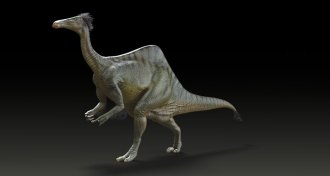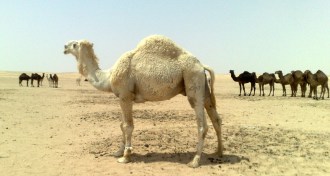All Stories
-
 Paleontology
PaleontologyMystery fossils belonged to giant ostrichlike dinosaur
Two recently found skeletons reveal that Deinocheirus, first discovered 50 years ago, was the largest-known dinosaur of its kind.
By Meghan Rosen -
 Physics
PhysicsMagnetic detector identifies single protons
An MRI-like machine can scan an individual proton, raising prospects that a similar technique could eventually image biological molecules one by one.
By Andrew Grant -
 Planetary Science
Planetary ScienceMars orbiter snaps close up of comet Siding Spring
NASA's spacecraft are giving astronomers a good look at a comet from the Oort cloud.
-
 Health & Medicine
Health & MedicineThere’s no need to panic about enterovirus
The enterovirus behind this year’s outbreak, EV-D68, has been around for decades and generally causes mild symptoms.
-
 Astronomy
AstronomyA musician composes a solar soundtrack
Robert Alexander combines life long passions of both music and astronomy to uncover solar secrets.
-
 Environment
EnvironmentEngineered plants demolish toxic waste
With help from bacteria, plants could one day clean up polluted sites.
By Beth Mole -
 Humans
HumansAnglo-Saxons left language, but maybe not genes to modern Britons
Modern Britons may be more closely related to Britain’s indigenous people than they are to the Anglo-Saxons, a new genetic analysis finds.
-
 Physics
PhysicsLaser tractor beam tugs on beads
A new experiment is the first to construct a tractor beam that can pull objects over long distances with light.
By Andrew Grant -
 Genetics
GeneticsCamels’ number of humps may affect their fat storage
The number of humps camels and alpacas have may play a role in how well they store and break down fat.
-
 Genetics
GeneticsGene variant helps dog evade muscular dystrophy
A dog that has a mutation causing muscular dystrophy has another genetic variant that appears to counteract the disease.
-
 Science & Society
Science & SocietyTwo books explore winding path from basic science to useful invention
‘How We Got to Now’ and ‘Science Unshackled’ explain how basic scientific research can transform society in unexpected ways.
By Sid Perkins -
 Planetary Science
Planetary ScienceComet Siding Spring makes close pass by Mars
Mars appears to have survived its close encounter with comet Siding Spring mostly unscathed.